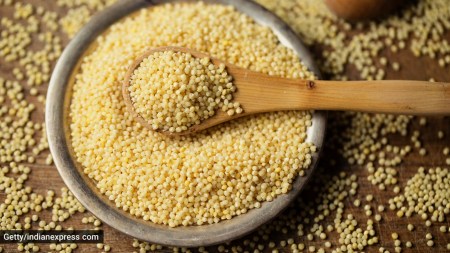Does maida or refined flour stick to your gut lining? Experts weigh in
As the diet and fitness world evolves, so do the myths surrounding various food items. One such revolves around maida, also known as all-purpose flour or refined flour. Many believe that maida sticks to the walls of the gut or the gut lining, leading to digestive troubles. But how accurate is this claim? Nutritionist Amita Gadre recently addressed this issue on Instagram, debunking it as one of the most persistent myths.
“Maida does not stick to your gut. Even if maida/refined flour is sticky — no one is eating the dough as is, and even if you did — it would undergo systematic digestion and breakdown in our digestive system and then get absorbed in our body as simple carbohydrates,” said Gadre.

According to her, nothing can stick to your gut, as it is a very dynamic and active organ.
To verify this, and to understand the right way to include maida in our meals, we decided to reach out to experts.
Dietitian Simrat Bhui noted that no scientific claims suggest that maida sticks to one’s gut lining. “Maida is low in fibre and does not hold much water, therefore eating it regularly can lead to constipation and other digestive disorders. But the process of digesting the cooked maida item will be the same. So, eating maida base items on an occasional basis does not harm, however excess of anything is harmful,” she said.
 What’s your diet like? (Source: Freepik)
What’s your diet like? (Source: Freepik)
While it’s true that there is no immediate risk with its consumption, maida does pose a serious problem in the long run and is something you should avoid for good health. “Besides maida being low in fibre and very high in glycemic index, which spikes blood sugar, the bigger problem with it is its high content of gluten,” said functional nutritionist Mugdha Pradhan, CEO and founder, iThrive.
While maida may contribute to digestive discomfort in some individuals, its effects can vary depending on factors such as overall diet, hydration, and individual digestive health, said Dr Vikas Jindal, consultant, Dept of Gastroenterology, CK Birla Hospital, Delhi. “Consuming maida in moderation as part of a balanced diet is unlikely to cause significant digestive issues for most people.”
Adding, Pradhan said, “Gluten is a plant compound found primarily in wheat amongst other plants and is very bad for your gut health and known to damage the gut. And since your gut lies at the core of your health and affects every other organ, gluten ends up being bad for your overall health.”
View this post on Instagram
A post shared by Amita Gadre | Nutritionist (@amitagadre)
Gluten negatively affects everyone irrespective of whether you suffer from a serious gluten allergy (Celiac disease) or a milder gluten sensitivity (non-celiac gluten sensitivity) which is rampant and estimated to affect up to 30 percent of the population. “Gluten damages the gut in the long run and leads to a condition called leaky gut, which is a major contributor to most diseases today,” said Pradhan.
While maida may not directly stick to the gut, choosing whole grains and minimising processed foods can contribute to better digestive health and overall wellness.
Disclaimer: The copyright of this article belongs to the original author. Reposting this article is solely for the purpose of information dissemination and does not constitute any investment advice. If there is any infringement, please contact us immediately. We will make corrections or deletions as necessary. Thank you.





